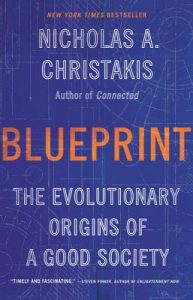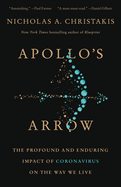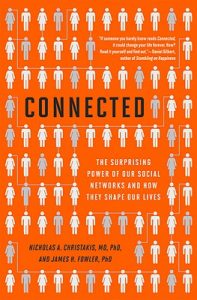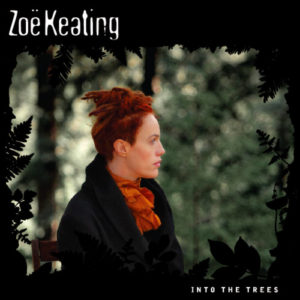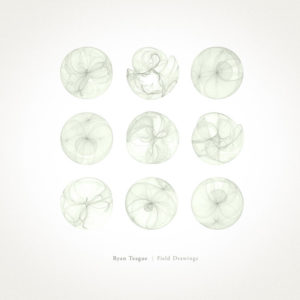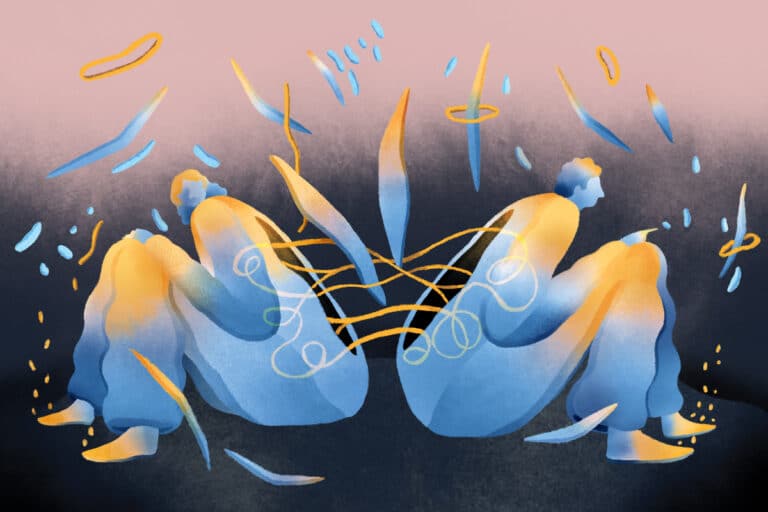Nicholas Christakis
How We’re Wired for Goodness
Elemental human capacities like friendship and love, teaching and learning, have tremendous, constant, practical force. We don’t think of these in terms of what has given our species the grit to endure through hard times and even evolve in the long run. They’re lived social intelligence, part of the everyday, and so can be hard to see as serious amidst the high tumult of our age. But these kinds of human qualities are what sociologist Nicholas Christakis studies from his Human Nature Lab at Yale and his life generously lived. He offers a wide lens, a broad perspective, that deepens and refreshes.
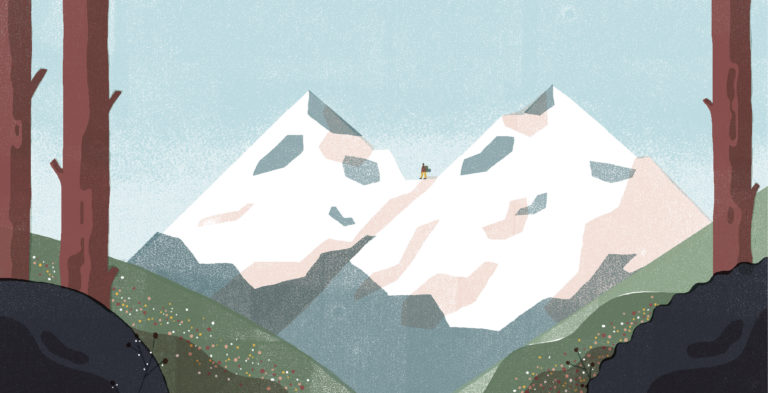
Image by Beth Walrond, © All Rights Reserved.
Guest
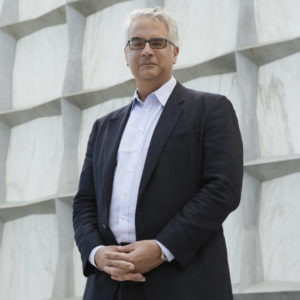
Nicholas Christakis is the Sterling Professor of Social and Natural Science at Yale University, where he’s also the director of the Human Nature Lab and co-director of the Institute for Network Science. He’s the author of Connected: How Your Friends’ Friends’ Friends Affect Everything You Feel, Think, and Do and Blueprint: The Evolutionary Origins of a Good Society. In October 2020, he published Apollo's Arrow: The Profound and Enduring Impact of Coronavirus on the Way We Live.
Transcript
Krista Tippett, host: Elemental human capacities like friendship and love in its many forms, teaching and learning, have tremendous, constant, practical force. We don’t think of these in terms of what has given our species the grit to endure through hard times and even evolve in the long run. They’re lived social intelligence, part of the everyday, and so can be hard to see as serious amidst the high tumult of our age. But these kinds of human qualities are what Nicholas Christakis studies from his Human Nature Lab at Yale and in his life generously lived. I spoke with him in January 2020, and this conversation shaped how I made sense of the past year, how I looked for hope within it. His thoughts feel more immediately applicable to the world that is now upon us. He offers a wide lens, a broad perspective that deepens and refreshes.
[music: “Seven League Boots” by Zoë Keating]
Nicholas Christakis: It’s like standing on a 10,000-foot plateau and noticing that one hill is 300 feet, and one hill is 900 feet, and becoming obsessed that what is it that explains the difference between these two hills. But if you step off the plateau and go at some distance, you see that actually those are two mountains, and actually, the forces you were previously focused on — of local erosion or human action — are trivial in comparison to the plate tectonic and volcanic forces that caused these huge mountains. And it’s those kinds of super powerful forces acting below the surface that interest me — especially since, to my eye, those forces are primarily forces for good. And I think they’ve been neglected.
KT: I’m Krista Tippett, and this is On Being.
Nicholas Christakis is the author of several books, including Blueprint: The Evolutionary Origins of a Good Society. He is also well-known for his work in social contagion, behavioral contagion, which he brought to bear in his most recent, 2020 book, Apollo’s Arrow: The Profound and Enduring Impact of Coronavirus on the Way We Live. He lives in New Haven, Connecticut, where he is the Sterling Professor of Social and Natural Science at Yale.
You were born in New Haven, where you are now. [laughs] But it sounds like your parents were both —
Nicholas Christakis: It’s like the circle of life. [laughs]
Tippett: Right, right. But they were Greek, and they were Fulbright Scholars, graduate students at Yale.
Christakis: How did you know that? That’s right.
Tippett: I have done my homework. You’re gonna be amazed at how much I know about you now.
Christakis: Oh, my goodness. Yeah, it was pretty interesting. Their stories — and I don’t know how much you want to go into it, but it’s sort of an amazing story, in particular in my mother’s case. My father came from kind of a middle-class background in Greece. My dad wanted to be an actor, but his father insisted that he go into physics. And so my father winds up as a Fulbright Scholar at Princeton in the 1950s, arriving just after Einstein dies. And my mother, who came from a well-to-do family in Greece, astonishingly had, in her dad, a man who was willing to educate his daughters, which I have to emphasize is really unusual for a man of his generation in Greece. And so she got into Vassar, also on a Fulbright, and comes to the United States. So they independently come, and then they’re set up through the Greek community here, and etc. And then they both go to graduate school at Yale, and that’s where I’m born, in New Haven.
Tippett: So I start most of my conversations, whoever I’m speaking to, to inquire about the religious or spiritual background of someone’s childhood, however you would define that now. I’ve seen you say that you were raised on a heavy diet of Greek mythology. I don’t know if that’s where your mind would go with that.
Christakis: Well, not on the religious sense, necessarily; on the Greek mythology, yes, that’s true. And the story in my childhood is that my mother and father used to take me to the Greek Orthodox church — I want to say it was St. Constantine, but I can’t remember — in Washington, D.C., when I was growing up. And one day, I was so annoyed by this that I vomited in the aisle, and my parents decided that I would not be taken back.
Tippett: [laughs] That was it.
Christakis: That was it, yes. That was my childish way of — and that was my religious upbringing. And I would describe myself as “agnostic, but with a high propensity to religiosity,” is how I would describe myself.
Tippett: We could talk about that for a couple of hours; I love that. So as you know, as you well know, we are speaking in a moment in which I think many Americans and people in many countries around the globe would say tribalism suddenly feels more possible, more prevalent. And a thrust of your scholarship and what you write about is that that same capacity that is in human nature, that is in human experience, to surrender our individuality and feel so aligned with a collective in a way that can surprise us and might even go against our self-interest and turn us against others — that within that very — the other side of that same capacity is our ability to be charitable. And this is not a message that science or the academy — or, as I’m very focused on, journalism — has been presenting in modernity. So I just really want to start drawing that out.
Christakis: Yeah, I mean, I think first of all I would emphasize that what I’m interested in is not so much the qualities that make a human being as an individual good, I’m interested in the qualities that make a collective good. How is it that a group of humans come together to form a good society, and in what way and to what extent has evolution equipped us with these capacities? And just to illustrate very quickly, I’m talking, for example, about our capacity for love and friendship and cooperation …
Tippett: And we’re gonna go into all those things.
Christakis: … and teaching, all of which are quite unusual in the animal kingdom, and yet, we humans do this. Certain other animals also do this.
But the point is, for too long, in my view, as you’ve already mentioned, scientists and citizens on the street have focused on the dark side of human nature, on our propensity for selfishness and tribalism and mendacity and cruelty and violence, as if this were a natural or normal or primary state of affairs. And yet, I think the bright side has been denied the attention it deserves, because equally, we are capable of love and friendship and teaching and cooperation and all these other wonderful things. And in fact, I would argue that it’s — those qualities are more powerful than the bad qualities and therefore, in some ways, much more important.
I think if every time I came near you, you were mean to me, or you filled me with fake news, you told me falsehoods about the environment in a way that was detrimental to my capacity to survive in the environment, or you killed me, I would be better off living apart from you. But we don’t do that. We live together. And so therefore, the benefits of a connected life must have outweighed the costs. And they did outweigh the costs. And the question is, how did that state of affairs come to be?
Tippett: I think it’s also an important distinction that you are working in long time scales. You’re talking about evolutionary forces. You’re not talking about historical moments or even the arc of history, you’re talking about the arc of evolution.
Christakis: Yeah, I mean, I think cultural and historical forces are extremely important, and they’re very powerful. But I’m interested in forces that have been operating for much longer periods of time and that I would argue are more powerful and more fundamental, and in fact, every argument that I make in the book I could make about human beings who were alive 10,000 years ago, before the action of a lot of the technological and historical forces that we take as so relevant and ascendant today. So we were capable of love and friendship and living together 10,000 years ago, and we were also capable of violence, of course, then, too, but all of these things were a part of our nature well before we then had this overlay of cultural and technological and historical forces acting, and in some ways I would argue that those forces are a thin veneer overlaid on a much more fundamental edifice.
And one of the metaphors that I use in the book is that in some ways we’re deluded into thinking that these cultural forces and cultural differences are so big and so important, and it’s like standing on a 10,000-foot plateau and noticing that one hill is 300 feet, and one hill is 900 feet, and becoming obsessed that what is it that explains the difference between these two hills. But if you step off the plateau and go at some distance, you see that actually those are two mountains, one of which is 10,300 feet and the other of which is 10,900 feet, and actually, the forces you were previously focused on — of local erosion or human action — actually are trivial in comparison to the plate tectonic and volcanic forces that caused these huge mountains.
And it’s those kinds of super powerful forces acting below the surface that interest me — especially since, to my eye, those forces are primarily forces for good. And I think they’ve been neglected.
[music: “Sun Through Rails” by Chequerboard]
Tippett: I’m Krista Tippett, and this is On Being, today with sociologist Nicholas Christakis. His research describes cultural universals that our species has evolved — an array or suite of capacities that make society possible. These include love, friendship, teaching, cooperation, and the ability to recognize the uniqueness of other individuals.
[music: “Sun Through Rails” by Chequerboard]
So let’s walk through some of the aspects, what you describe as a “social suite,” a suite of capacities, which — you’re really saying that these things are like genetic coding for the structure and function of our societal life. They’re like breathing; they’re automatic, not socially engineered. And one thing that you’ve said is that the social engineering cannot escape this social suite.
There’s this striking sentence: “There is no society on Earth that has an easy job of suppressing our innate tendencies to love, friendship, and cooperation.” It’s not quite that simple; there are also ways in which social engineering tried to do something that sounded utopian, and that doesn’t work, either, if it goes against this way we are made, is really what you’re saying — built.
Christakis: Yeah, I mean, that’s exactly right. The bottom line of all of this is that there’s really only one way to be social. And there are certain archetypical structures and ways of organizing society that we basically are innately programmed to manifest and that we can no more wake up and make a society inconsistent with those impulses than ants can wake up and make beehives. This is how we live socially. It’s been shaped by natural selection, and we are endowed with these capacities. And it takes a very powerful force to stop it.
And these capacities include, for instance, the fact that we love the people we’re having sex with. We form sentimental attachments to them. We are technically monogamous. We befriend each other. We form long-term, non-reproductive unions with other members of our species. This is exceedingly rare in the animal kingdom. We do it, certain other primates do it, elephants do it, certain cetacean species do it — we form friendships with unrelated people. It’s universal in human groups. We cooperate with each other, altruistically. We’re kind to strangers — again, to unrelated individuals. This is different than many other types of cooperation, which are also seen in other animal species, but often that cooperation is between genetically related individuals. We do it with genetically unrelated individuals. We teach each other things. People take this for granted, but it’s actually unbelievable.
Tippett: I love this. I love this, that this is in the social suite — teaching and social learning.We never think about that as a beautiful thing we do and that we all participate in, all of our lives.
Christakis: Yes, and it’s a kind of altruism. It’s a kind of gift, when you teach someone something. And if you think about it, basically every animal can learn — a little fish can learn that if it swims up to the light, it’ll find food there. That’s independent learning. And some animals learn socially, and this is extremely efficient. So you put your hand in the fire, and you learn that it burns, so you’ve acquired some knowledge at some price. Or I can watch you put your hand in the fire, and I get almost as much knowledge for none of the price, which is really super-efficient. Or I observe you eat red berries, and you die. And so now I’ve learned something at no cost. It’s amazing, right?
But we do something even more than that — we copy each other, we imitate each other, we learn from each other, which is rare in the animal kingdom, although it happens — we teach each other things. We set out to teach you how to build a fire. And this is exceedingly rare, but it’s universal in us. And so these are some very positive, amazing qualities that are shaped by natural selection, are encoded in our genes, and are universal in humans and that are good and that serve to countermand some of our vile propensities, which, alas, we also have.
Tippett: You’re so right. It’s like these things are so obvious and taken for granted, but it harms us that we don’t take them as seriously as we do what is dark and evil and destructive. And I was thinking — as I was reading you, I was thinking, there’s this phrase, “the better angels of our nature,” from Lincoln. And that is a phrase that you can throw into any conversation, any speech, and we all know, right — we know what that means. We understand that. But we don’t actively — certainly, when we think about our shared life, our societal life, our political life, we treat that like a sidebar for special occasions and not as something … [laughs]
Christakis: Like a “nice to have,” instead of “must-have.” Well, first of all, that’s a magnificent phrase, and it’s also, as you know, the title of my colleague Steve Pinker’s fantastic book. And I think Steven argues — correctly, in my view — that beginning around 300 years ago with the technological advances of the Enlightenment and the philosophical moves in the Enlightenment, committed to the equality of all human beings, democratic governance, and other ideas, which, to be fair, were unequally applied, but nevertheless, they started at a particular historical moment in Europe and spread around the world from there. So there was no doubt that these technological advances and these philosophical moves have contributed to an extraordinary improvement in human well-being. We’re safer, we live longer, we have greater freedom — it’s unbelievable, what’s happened in the last 300 years.
But my argument is that you don’t need to just look at what I would regard as relatively recent historical and cultural forces to get an account of a good life. Deeper, more powerful, more ancient forces are at work, propelling a good society, endowing us with these wonderful capacities, which were always there, are still there, are unavoidable, and that if anything, these moves that we’ve made as a species in the last few hundred years are, again, as I’ve said, this thin veneer over this more fundamental reality of the better angels of our nature.
Tippett: Well, and — right, and also, as you acknowledge, and I think it’s important to underscore that, the “we” — I’m learning to use that word “we” more carefully — because that “we” was incomplete and uneven, of who was receiving all that benefit.
Christakis: Yeah, I think — you mean, during the historical. But I would say that one of the advantages of my argument is that everyone got the benefit. It was all of us. It was our human species. Love was present everywhere and at all times.
Tippett: OK, and that’s an important point, too.
Christakis: We didn’t need the Enlightenment to allow us to have —
Tippett: We didn’t need the Enlightenment to love or be friends.
Christakis: Correct. That’s my point.
Tippett: Yes, yes, yes. And I think for a moment like this, where there is, as I see it, a real imperative, a calling for us to step more robustly into these capacities, so what I’d like to do is dwell on some of these aspects that you’ve just named and get into some of the nuance of them, which is really thought-provoking and, I think, potentially behavior-provoking. [laughs]
So “love,” which is one of the most watered-down and overused words in the English language, and yet, as you point out — I think what’s so interesting to me about your research is that yeah, as you said, we don’t just have sex, we form loving attachment, and that this is true in all kinds of societies and sexual preferences. It’s also true in places where monogamy is not the rule. Let’s take this in, that this is what it means to be human — to love.
Christakis: Yes, I think it’s a key aspect of our capacities. We’ve been endowed with this capacity — again, to form sentimental attachment to people we’re having sex with, whether it’s monogamous, polygynous, polyandrous; whether it’s straight or gay. You know, we could mate with each other, and many animals do that, but we don’t just do that.
And just to back up for a moment, there’s an idea in evolutionary biology that is known as a preadaptation, or an exaptation. That’s when evolution equips an organism with a feature that originally evolves to serve one purpose, and then suddenly, once it is there, can be used for a different purpose. And one of the most famous examples of this is feathers, the evolution of feathers, which, it is felt, originally evolved in dinosaurs as a kind of insulation, but once those feathers evolved, they were actually quite useful for the evolution of flight.
Tippett: And you think love — is love a similar thing?
Christakis: Yes. I think that love is to …
Tippett: It had this purpose.
Christakis: … well, is to flight. Love is the flight part. So what were the feathers? Well, the feathers were — in women, it is felt, women evolved attachment to their babies and that eventually [laughs] this served as a preadaptation to love of mates — [laughs] of the men who had impregnated them. So in other words, so many men who feel like when their partners look at them, she’s looking at them as if they were a baby, [laughs] it may be true.
Tippett: [laughs There’s an anecdote you tell, or a true thing, about — it’s a story about the Hadza, the ancient people of Tanzania, who are hunter-gatherers, the original, still-existing, hunter-gatherers. You list what they say when they’re asked what they want in a mate and that it sounds exactly like a contemporary internet dating profile: “Sexy, hard worker, only wants you, understanding and gentle, doesn’t use bad words, cares for kids” — that we’re so similar about this thing …
Christakis: Yes, isn’t that amazing?
Tippett: … that nothing has changed [laughs] in tens of thousands of years.
Christakis: It’s very moving.
Tippett: Let’s talk about friendship, which — I don’t know, there’s this wonderful quote from you, of Ralph Waldo Emerson: “A friend may well be reckoned the masterpiece of nature.” And to me, I think especially as I grow older, friendship is one of the most meaningful — I think of it as a form of love in my life that just grows more and differently important. You make a connection between friendship and the foundations for morality.
Christakis: I make a connection between all the elements of the social suite and morality. So part of my argument is — and here I need to be careful to avoid — not everything that’s natural is good, but it is the case that many of these virtues that we have been discussing, love and friendship, for example, or cooperation or teaching, etc., are capacities that have been shaped by evolution that are universally seen as good and that are, in my view, necessary for a good society or a society in which we can live together. And here I borrow on moral philosopher Philippa Foot’s ideas about how we can reason about the origins of morality.
Tippett: Well, what this brings to mind, for me — I’m thinking a lot, these days, about — in conversations around conflict transformation and culture shift, social transformation. But when you have true culture shift, which always has been decades in the making, there are these cores of small groups of friendships that formed across difference, which didn’t necessarily make people alike or make people agree, but created a different — opened a different possibility for how they could share life.
Christakis: Yeah, I — that’s right, but — so first of all, I need to back up and say one other piece of information, which is that one of the paradoxical elements of the social suite is the capacity for individual identity — that is to say that we are all unique. And this might seem quite odd. How could our uniqueness be essential to our socialness?
But it is. And the reason is as follows — that we use our faces to communicate our unique identity. So every one of us has a different-looking face. Why? Why is that? Why don’t we all have the same face? It’s an evolutionary luxury that we are able to each have a different face. Every kidney, to do its job, in principle should function in the same way. But every face, to do its job, should in principle look different. They should all be different from one another. And not only that, not only do we all have different faces, but you can look out at a sea of faces, and you have the brainpower to distinguish one person from another, which is also an evolutionary luxury.
So we have evolved this capacity to signal and detect our uniqueness. And this is essential for social living, because if you don’t want someone to fail to feed you, when you’re an infant, and feed some other child, or forget that they had sex with you or not remember that you were mean to them and they should avoid you, you need some way of signaling, “this is me, not some other jerk.” So we have evolved this capacity for uniqueness, which we communicate with our faces, and people can detect our specific identities, other members of our species.
Tippett: I do like that. I had written that line from your writing — “the deep irony that, in order to be social, we have to first be individual.” [laughs]
Christakis: Yes. In order to sustain friendships, you have to be able to distinguish one conspecific from another. And that relates to our capacity to go down a level, to the level of individuals, to start seeing each person as a unique human being, not as a kind of member of a group and therefore — and this is also part of our tradition and is best instantiated by Martin Luther King’s famous admonition or aspiration, which is that he looked forward to the time when his children would be judged by the content of their character, rather than the color of their skin.
[music: “Neo” by Ryan Teague]
Tippett: After a short break, more with Nicholas Christakis.
[music: “Neo” by Ryan Teague]
I’m Krista Tippett, and this is On Being, today with sociologist Nicholas Christakis from the Human Nature Lab at Yale. We’re exploring his observations from science and life about the underappreciated evolutionary power of goodness. He is perhaps best known for his research on how networks of friendship profoundly affect what we think, feel, and do. He originally trained as a physician, worked in hospice, and did groundbreaking research on the implications of the “widowhood effect,” the propensity of spouses to die soon after their partners.
I’m sure you’re aware of this, because when you speak about the science of this, the evolutionary purpose and function, it sounds clinical when, in fact, all of this is very personal at the same time — at the same time that it seems to be genetically encoded and a result of evolutionary forces over longer historical time than we can comprehend. I mean, for example, going back to your story, I found it so moving, reading about you. Your mother did die when she was young, and she was diagnosed when you were even younger …
Christakis: I was six.
Tippett: … with Hodgkin’s disease. And you ended up becoming a doctor, initially, and working in hospice. And you’ve said —
Christakis: All my mother’s sons became doctors, but I’m the only one that became … [laughs]
Tippett: That is so interesting, three sons who then go to medical school.
Christakis: Yes, but I’m the only one that became a hospice doctor. That’s correct.
Tippett: [laughs] But that you’ve written that it was your work in hospice, with people who were dying, that deepened your fascination with universal human inclinations and qualities.
Christakis: Yes, because death is another thing that unites us all, isn’t it? And —
Tippett: And each death is intensely personal, and yet — what was it that you saw there that — of course, death is universal, but it seems like you also experienced a universality to the experience of death.
Christakis: Yes, I think — I took care of thousands of people when they were dying. I have probably been present at many hundreds of deaths at the moment of death. And you can’t, in my view, spend as much time as I did, or as one might, with people who are dying and not come away with a number of recognitions. Our mortality and our frailty — we’re all soft on the outside — is so apparent, when you take care of people who are dying, and in some ways, the beauty of our species.
My mother died in a very — I took care of, as I said, thousands of people, and encountered very few who had quite the kind of death that my mother did. But she was fearless in the face of death. And she spoke about how, over the final years then months then weeks then days then, ultimately, hours of her death, how she would let things go. You had to let go of your aspirations to see the future. And you had to let go of your hope to see grandchildren. And you can’t control your body anymore. You can’t move your extremities or even control your bodily functions and so forth. And so you let go, you let go, you let go. And what’s the last thing that people let go? Their loved ones.
And honestly, it’s extremely rare that — in my experience as a hospice doctor — that people let go of their love before they let go of something else. So this, of course, this experience as a physician also informed my scientific interests, as you’re noting.
Tippett: Well, it seems to me, also, that it just informs what you’re looking for. I mean, here’s another example of this. When you were studying the widower effect, you started to be intrigued by how we affect each other at a social distance, well beyond what happens with partners, not restricted to couples or pairs. And you started to think then about “social networks” as living things.
That was such interesting language, to me, because when we speak — the language of “social networks” has come into common vocabulary through Facebook.
Christakis: And it doesn’t seem like a living thing at all, does it?
Tippett: Right, but you’re talking about — and to me, this is also — this is kind of transformative language — you say, “But no, look at this.” So yes, we may all be using social media, but we are all inhabiting and building and cultivating social networks with our lives.
Christakis: The kind of social networks I talk about and am interested in, of course, are not the recent, online variety, but the kind of networks that we humans have been making for tens of thousands of years — the face-to-face networks that we’re all embedded in and that shape our lives. And a very simple, rapid example I can give someone is that you’re, right now, you have friends who have friends who have friends, and so forth. You’re in this web of social interactions, and you can’t really see what’s happening among your friends’ friends’ friends or your friends’ friends’ friends’ friends, for example.
But right now one of those people is infected with the flu, and inexorably, inevitably, that pathogen is going to reach you, and you’ll be infected. And so your fate depends on what’s happening in this network over which you have no vision and no control. So yes, so we are all embedded in these networks. We have evolved to make them. And so I realized that the widowhood effect that I had been studying in the lab at the time was not, of course, restricted to husbands and wives and wasn’t even restricted to dyads. It could ripple outwards. And that’s actually what prompted my shift to begin to study — scientifically study human social networks.
Tippett: I think this is such important knowledge. I mean, it feels to me like — to me, one of the great discoveries of our lifetime is neuroplasticity. Now what we’re really learning is that our brains keep forming across the lifespan and that we can have input into that, even with our behavior and with our choices. And it feels to me like what you’re describing is a corollary to that — that we also have agency to realign societally. And I feel like just the first step is seeing — taking seriously that we have this important capacity to rise to the better angels of our nature, and so does everything around us.
Christakis: Yeah, I mean, I think we are equipped with these capacities. Now, we don’t always enact them, of course, but we do have them, and I think they’re readily available tools for us to rely on, to make better, more good, societies. That’s right.
I also — it’s important to note that there are many forces that can steer us away from that. So for example, during the period of power of the Stasi in East Germany, they were able to cultivate so much suspicion that friendship became a serious hazard in East Germany, that you couldn’t trust anybody. Your friends could be ratting out on you. I think after the fall of the Berlin Wall it was discovered that 50 percent, approximately, of the population of East Germany were reporting on [laughs] their friends and neighbors and even family.
Tippett: Well, you know, I lived in Berlin in the ’80s and have my Stasi file, so I could talk to you about that, because it affected friendship, it created boundaries that you made instinctively, but it didn’t impede this basic impulse, or even the pleasure and importance of it that you’re describing.
Christakis: That’s good to hear. So even the Stasi were unable to suppress this friendship capacity.
Tippett: They were able to complicate it but not make it go away.
Christakis: What was in your Stasi file, if I may ask? [laughs]
Tippett: Well, we’ll have coffee next time I’m in New Haven, and I’ll tell you.
Christakis: Please, contact me. Bring the file.
Tippett: [laughs] All right.
I found it fascinating — you told the story somewhere about — we didn’t even talk about this, but you burst onto the scene, originally, with your work on connectedness and friendship. And the thing that got such attention was your study on how obesity is kind of contagious. So there was a lot of press about that. And you told this story somewhere about the European emphasis in reporting that was different — whereas Americans said, “Are Your Friends Making You Fat?” whereas when the Europeans reported it, it was, “Are You Making Your Friends Fat?”
Christakis: “Are your friends gaining weight? Perhaps you are to blame” …
Tippett: [laughs] Right.
Christakis: … which I just love the inversion between — it was actually the Brits, not the Europeans. The British headlines were totally the opposite of the American headlines.
Tippett: Which just, to me, speaks to this — to me, what is so empowering about your research is that it does suggest agency. I mean, as you’re saying, there are many reasons that we aren’t living to our best selves. But these are serious capacities, as serious as our capacity to be hateful or evil or selfish.
Christakis: I think you’re meandering towards the whole topic of free will, which is something that I struggle with. So I think there’s an enormous literature on how you think that you’re choosing to buy an iPhone because that’s what you want, but actually you have no free will at all, it’s all your friends are buying an iPhone, and you’re just copying them — and even other, more remarkable work in the neurosciences that show that people often start actions before they’re even aware of them, and it’s not just reflexes, and using certain detailed recordings from neurons in the brain. So there’s all this literature that suggests that we have much less free will than we think, and many people have looked at our work on social contagion and said that what we have done is delivered a whack to free will and said that somehow denigrated it or limited its importance.
Tippett: Yeah, no, I don’t see it that way. I see you in the category of the social virtue of teaching and social learning — giving us knowledge that can be a form of power to exercise free will.
Christakis: Yes, that’s exactly sort of where I was going, which is that all of what I just said is true, but it’s equally the case that when you take an action in your life, what our work suggests is that you can affect dozens, hundreds, sometimes thousands of other people. When you act in a nice way to other people, when you teach other people things, when you are cooperative or loving or show concern for your community, these effects are magnified. And so actually, if anything, I think the importance of free will is raised, not lowered, by these discoveries, because it shows that people who take volitional acts of their own will to improve the state of affairs around them can actually have much larger and more dramatic impacts than they had appreciated. And I think that people making choices about how to live their lives and live with others is crucially important and that we have the responsibility to work with the better angels of our nature.
[music: “Unseen (Bonus Track)” by Helen Jane Long]
Tippett: I’m Krista Tippett, and this is On Being, today with sociologist Nicholas Christakis.
[music: “Unseen (Bonus Track)” by Helen Jane Long]
I really care about scholarship and ideas and true knowledge, but I also care about whether those things are lived and whether they are also brought in relationship with lived experience. And I think one reason I want to interview you is because I really see that in your life. And [laughs] I was very touched by the dedication of your book, Blueprint: “The world is better the closer you are to Erika,” about your wife. I remember, actually, when we met at a conference, just through the way you mentioned her, I could tell that this was a very loving relationship and the two of you — that you also had adopted siblings, growing up, and you all have several children, older children, and have adopted a foster son.
Christakis: Yes, Erika and I have embarked on a new adventure. We’ve just adopted a ten-year-old boy who we adore. We’ve been foster parents for a while, and this little child needed a home, and we decided we would take him in. My other children are 22 and 25 and 27, so it’s …
But I grew up in — my mother had three biological children and adopted two others. And in fact, I grew up in an interracial family, so I have a Black sister and a Chinese brother. And my wife’s sister has adopted a child, so adoption is also a feature of our extended family.
Tippett: And it feels to me consonant with all these things we’ve been talking about, about our very interesting capacity as a species to love and to befriend beyond biological kinship. It’s not a contradiction, it’s just kind of a — it’s not even a tension — an interplay here between the science of our evolutionary development and the fact that, with these qualities we’ve been speaking about, the “social suite” — love, friendship, cooperation, teaching, and social learning — it’s not that they’re easy or always fun or always pleasurable, but there is also a great measure of pleasure in them, something not at all clinical.
Christakis: Well, generally speaking, one of the ways that you can make an animal do more of something is to have it evolve so that it sees that thing as being pleasurable.
Tippett: So that makes sense.
Christakis: And so that kind of warm glow we all feel in the company of our friends, I think, is an evolved capacity. We seek out our friendships because we feel good when we are with our friends.
Tippett: And actually, being kind and being generous, those things also make us feel good. We don’t always do them. So I just wanted — this kind of circles around, to me, to this phrase or this word I think you’ve coined, which I find very intriguing, of “sociodicy.” [laughs] I mean, I studied theology, but I don’t think everybody who doesn’t study theology, which is most people, learned the language of “theodicy,” which is just this ancient question, very important in the Enlightenment and in Western civilization, of how can you believe in a good God if terrible things happen?
Christakis: How can we justify God if — especially an omnipotent, omniscient, beneficent deity, given how much suffering and awfulness we see in the world? How do we explain the origins of evil? Right.
Tippett: And sociodicy is your idea.
Christakis: Yeah. So how can we vindicate a confidence in the goodness of society, despite the manifest evil in society? I mean, I’m well aware — I’m not a Dr. Pangloss. I’m well aware that every century, every millennium, is replete with horrors. We have slavery and pogroms and colonialism and violence and hatred and venal actions of all kinds. But equally, we have goodness of the kinds that we’ve been discussing today. And so for me, this issue of sociodicy is a vindication of our confidence in the goodness of society despite these horrors. And what I’m trying to highlight is that even our evil qualities are features of our humanity. And they are — in fact, often these good qualities that we’ve evolved are in response to those evil qualities.
I’ll just give you one very quick example. Human beings have very few, if any, natural predators. The leading killer of human beings is other human beings. [laughs] And so we’ve had to evolve to cope with this threat to our survival, which is each other. And so we have evolved. We have evolved these capacities that make us capable of a convivial existence, by and large. I’m not saying we don’t kill each other. We do. I recognize that. But they’re all connected, you see. They’re all intermingled with each other. And I think that we can gain better insights into our common humanity, our shared humanity, by taking more seriously and focusing more attention on these wonderful qualities, these wonderful capacities that we have evolved to have. And I really believe that.
Tippett: I wrote a book about wisdom a few years ago and realized after the fact that I’d never defined wisdom. And so that was one of the first things people would ask me when I was speaking about it afterwards. And what I realized when I sat down to think about a definition of wisdom, as opposed to knowledge or accomplishment, which — so a wise life can certainly contain knowledge and accomplishment, and those are things you can point at and quantify, or you can point at and you can describe. But I think that the measure of a wise life is the imprint it has on other lives around it. When any of us start speaking about the wise people we’ve known, that’s kind of the story we’re telling. And your thinking about [laughs] the natural social networks that predated social media by hundreds of thousands of years, the primacy of friendship and love and these qualities we have that we don’t stop to treasure and to take as seriously, actually helps me see, helps me think differently, gives nuance to that idea of what is wisdom in our midst. It’s also a function of that — that wise people emerge from that.
Christakis: I would agree.
Tippett: I wonder how you, at this point in your life, would — this is a vast question, this question of what it means to be human. But how would you start to answer that, just think that through right now, what you’ve learned about what it means to be human?
Christakis: I love that phrase, “What are you going to do with your one wild and precious life?”
Tippett: Mary Oliver.
Christakis: And I’ve always been of the belief that — if possible, and not everyone has this opportunity, although everyone can, I think, in some measure. I mean, even Victor Frankl, in the concentration camps in Man’s Search for Meaning, writes a little bit about this related idea — is to try to live a life that is what I would call grand and romantic, which is to be in tune with and aware of the opportunities for transcendence, to move beyond the everyday desires, needs, very physical reality that we all face, of course, and see the fact that there are other things, whether it’s love and friendship that we’ve been talking about today or other sorts of things that take us outside of our corporeal bodies. So I think that cultivating that capacity, cultivating the ability, as you go through your day, to see the opportunities for transcendence, is a wonderful way to live. And I think it’s possible to do that in almost any circumstance. And I think it makes life much, much better and more enjoyable.
I was very affected, and I haven’t been able to find the source for this, but when I was in medical school — so this was in the 1980s — I heard or read an interview. I think these Buddhist monks had come to MIT, and it was in the early days of MRI scanning, and they were scanning their brains or something and looking at how the discipline of meditation had changed the brains of these monks. And one of these guys was interviewed about how he copes with moving through the world and all the knocks and slights and things that happen in anyone’s day. [laughs] And he told the following story about how he was constantly re-narrating whatever he encountered. He was always trying to see it in a good light. And this being in Boston, someone said, “Well, what if someone cuts you off in traffic?” [laughs] And the monk said, he said, “Well,” he goes, “I would imagine that in the backseat of the car, there was a woman delivering a baby. And the husband was driving the car, and he was desperate to get his wife to the hospital, because a new life was being born, [laughs] and that all of a sudden, I wouldn’t think of it as being cut off in traffic anymore.” And I heard this story, and I pulled over, and I was like, oh my God. I want to be like that guy, [laughs] if possible.
Now, I don’t have the discipline of a Buddhist monk, but I think that’s the right way to be, honestly. I really do. And this is not, I want to emphasize, this is not in a kind of Pollyanna-ish way of ignoring all the evil in the world or not defending yourself or any of those things. I’m just saying that if possible, in moving through your day, so much better to see it that way.
[music: “Cachoeira” by Aukai]
Tippett: Nicholas Christakis is the Sterling Professor of Social and Natural Science at Yale University, where he’s also the director of the Human Nature Lab and co-director of the Institute for Network Science. He’s the author of Connected: How Your Friends’ Friends’ Friends Affect Everything You Feel, Think, and Do, and Blueprint: The Evolutionary Origins of a Good Society. In October 2020, he published Apollo’s Arrow: The Profound and Enduring Impact of Coronavirus on the Way We Live.
[music: “Cachoeira” by Aukai]
The On Being Project is located on Dakota land. Our lovely theme music is provided and composed by Zoë Keating. And the last voice that you hear singing at the end of our show is Cameron Kinghorn.
On Being is an independent, nonprofit production of The On Being Project. It is distributed to public radio stations by WNYC Studios. I created this show at American Public Media.
Our funding partners include:
The Fetzer Institute, helping to build the spiritual foundation for a loving world. Find them at fetzer.org.
Kalliopeia Foundation, dedicated to reconnecting ecology, culture, and spirituality, supporting organizations and initiatives that uphold a sacred relationship with life on Earth. Learn more at kalliopeia.org.
The Osprey Foundation, a catalyst for empowered, healthy, and fulfilled lives.
The Lilly Endowment, an Indianapolis-based, private family foundation dedicated to its founders’ interests in religion, community development, and education.
And the Ford Foundation, working to strengthen democratic values, reduce poverty and injustice, promote international cooperation, and advance human achievement worldwide.
Books & Music
Recommended Reading
The On Being Project is an affiliate partner of Bookshop.org and Amazon.com. Any earnings we receive through these affiliate partnerships go into directly supporting The On Being Project.
Sponsors
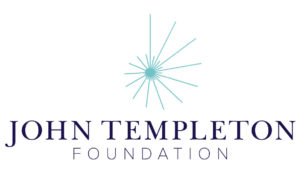
Funding provided in part by the John Templeton Foundation. The Templeton Foundation supports research and civil dialogue on the deepest and most perplexing questions facing humankind: Who are we? Why are we here? Where are we going? To learn more, please visit templeton.org.





